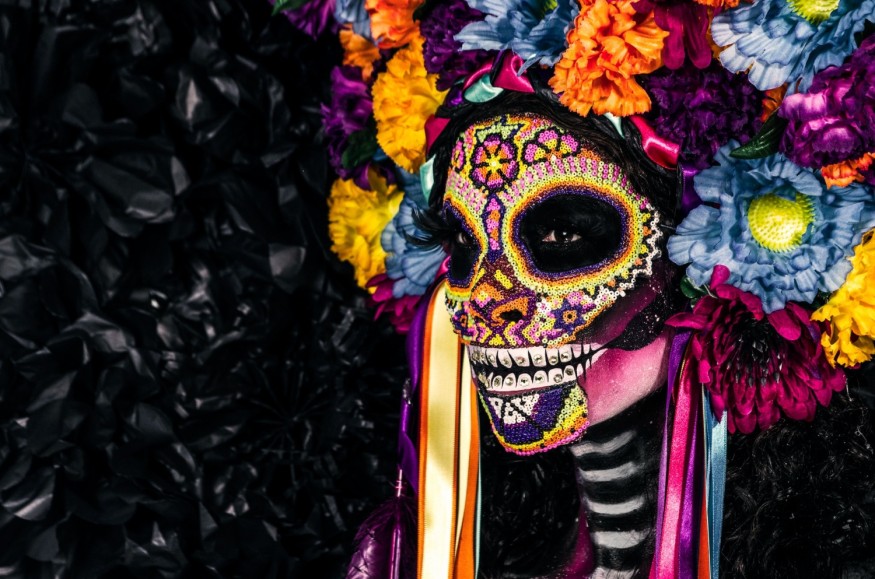Three Steps to Respectfully Celebrating Dia de los Muertos as an Outsider

Dia de los Muertos, or Day of the Dead, is a beautifully vibrant, joyful, and spiritual Mexican tradition celebrated worldwide. Though the holiday may appear morbid to the untrained eye, it is actually a beautiful commemoration of loved ones who are no longer physically with us and a time of reflection, happiness, and connection with our past.
Despite the deep personal and cultural significance of Dia de los Muertos, the tradition has gained a large global recognition, largely due to the release of the Disney Pixar film Coco in 2017. As a result, many outside of the Mexican culture have grown fascinated with the tradition. Still, they are unsure how, or even if, they can properly and respectfully participate in the celebration.
I, myself, grew up in Bulgaria before relocating to Mexico permanently for work. Although we have similar traditions such as Zadushnitsa or All Souls Day, it's still important to understand and practice the nuances as it pertains to a completely different culture. For those not from the Mexican culture, like myself, here's how we can still meaningfully and respectfully participate in Dia de los Muertos.
First, understand the significance.
The first step to respectfully participating in any foreign celebration is to take the time to learn and understand what it is you are celebrating. For outsiders, the most essential thing to recognize is that Dia de los Muertos is NOT a Mexican version of Halloween.
It is, rather, a celebration between families and their deceased loved ones. It's a time to remember and connect with ancestors through altars, called ofrendas, which adorn vibrant colors, photos, mementos, and food and drinks to welcome their spirits back into our world. So, even though you may see people in calavera makeup, also known as sugar skull makeup, it's important to discern the two holidays from one another.
Respect the traditions.
Dia de los Muertos is obviously close to Halloween on the calendar (see the previous section), so it's natural for those not familiar with the holiday to blend them together. However, respecting the tradition means to avoid cultural misappropriation. One way to prevent this is to understand the significance of the holiday and its symbols.
For example, traditional calavera makeup may resemble Halloween skull makeup on the surface level, but it should not be treated like a Halloween costume. Sugar skull makeup and Catrina figures are symbolic of a family's deceased loved ones and are displayed to keep their spirits close. With that in mind, adding blood or horror to sugar skull makeup is considered extremely offensive.
Another tradition is to create an ofrenda for your loved ones who have passed. This can be done respectfully by adhering to the custom of displaying photos, meaningful items, and their favorite food and drinks. There's no need to stray from the customary practices or turn the celebration into a costume party. You aren't adding anything new to the already sacred celebration and are more likely to come off as insensitive and offensive.
If you're not sure, ask.
As you become more familiar with the holiday traditions, you can start looking for Dia de los Muertos events within your community to attend. Though it's naturally a personal holiday, there are often many communal celebrations that are welcoming to new guests. Participating in these events can help provide a deeper understanding and connection to the tradition you won't get from simple research.
And if you are ever unsure of something, don't hesitate to ask. There is no shame in wanting to learn more about a different culture, and what better way is there to learn than from someone with first-hand experience? There are always individuals willing to share their knowledge and experiences with you. Just remember to ask with humility and respect.
Dia de los Muertos is meant for the remembrance and reflection of loved ones who have passed away, so being an outsider to the Mexican culture doesn't mean you can't join in the celebration. If you do decide to participate, it is essential to do so with respect, sensitivity, and a genuine desire to learn and appreciate the depth and significance of the tradition. At the end of the day, honoring this tradition serves as a reminder that love and remembrance transcend cultural boundaries and bring people closer together in their shared experiences of loss and love.
Bio
Valentino Danchev is a highly accomplished entrepreneur within the resort industry, serving as the dynamic CEO of Fidelis Marketing Group. In addition to his role in the business world, he is the visionary founder of The Chilpayate Foundation, a prominent non-profit organization dedicated to supporting children and their communities. Valentino is also a respected author known for his impactful work "MY GIFT TO THE WORLD." In this influential book, he explores innovative inventions and ideas aimed at eradicating poverty, disease, and death and addressing the global energy crisis. With a profound commitment to making a positive difference, Valentino continues to inspire change and foster progress in various spheres of society.
Subscribe to Latin Post!
Sign up for our free newsletter for the Latest coverage!















